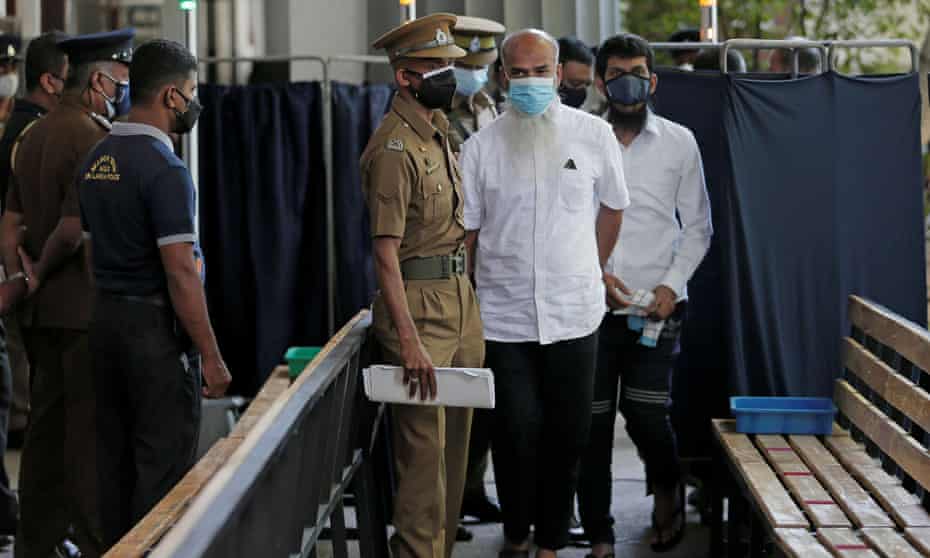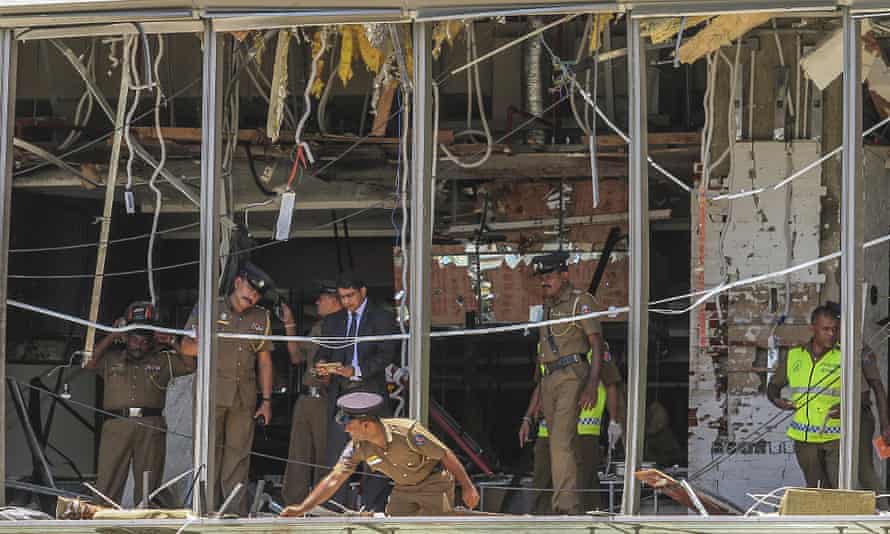Trial begins of 25 men over Sri Lanka Easter bombings in 2019
Posted on November 23rd, 2021
Hannah Ellis-Petersen South Asia correspondent Courtesy The Guardian
Government criticised for delay as suspects face charges relating to 269 deaths 30 months after attacks

The trial has begun of the 25 men accused of masterminding the 2019 Easter bombings in Sri Lanka, which killed almost 300 people when churches and luxury hotels were targeted by Islamic terrorist suicide bombers.
The lengthy process to reach trial after more than two years has been heavily criticised by families of those killed and the Christian church in Sri Lanka, who have accused the government of failing to take proper action against those responsible.
The suspects are facing over 23,000 charges in total, including conspiracy to murder, aiding and abetting the attacks, and collecting arms and ammunition.
Lawyers involved in the trial in the capital, Colombo, warned that the sheer scale of charges, and the thousands of witnesses listed in the case, could mean it drags on for up to a decade. The case will be heard before a special panel of judges.
All eight of the suicide bombers who carried out the Easter Sunday attacks on the three five-star hotels in Colombo and three Christian churches died in the blasts. However, their associates and relatives stand accused of being involved in planning and masterminding the terrorist attacks, the worst in Sri Lanka’s recent history.
They include YM Ibrahim, the father of two of the suicide bombers, Inshaf and Ilham Ibrahim, who targeted two hotels in Colombo and Mohammad Naufer, a Sri Lankan national accused of affiliation with Islamic State and masterminding the attacks.

Several other members of National Thowheed Jamath (NTJ), a home-grown extremist Islamic group believed to be behind the bombings, are also among the 25 standing trial.Advertisement
The attacks, which took place on 21 April 2019, killed 269 people, including 45 foreign nationals. In the aftermath of the attacks, a state of emergency was imposed on the country for four months and hundreds of Muslims have since been arrested, including a Muslim member of parliament. However, in recent months senior members of the church accused the police and the government of dragging their feet over bringing the case to trial.
A press statement released by the archdiocese of Colombo in August said: It is clear from this procedure that after such a long time the government has no interest in finding out the truth about the attack and they are going to cover it up and wash their hands.”
They accused the government, led by strongman president Gotabaya Rajapaksa, of capitalising on the Easter attacks to come to power at the end of 2019 on a mandate of security for Sri Lanka, but failing to live up to their promises.
The head of the Catholic church in Sri Lanka, Cardinal Malcolm Ranjith said last week that the families of victims were struggling to move on while they felt that justice had not been served. We are not here to take revenge upon anyone, nor have we called for anyone’s blood. But we need justice,” he said. On Sunday, members of the Catholic community held large demonstrations pushing for faster action.
Members of the Catholic community allege they are now being harassed for their actions demanding justice. Fr Cyril Gamini, director of the National Catholic Centre for Social Communications who has accused the authorities of complicity with the attackers, was recently subjected to three days of questioning by Sri Lanka’s central intelligence department.
The trial is one of three that will be held in connection with the attacks. On Monday, the trial began for several senior officials accused of criminal negligence for failing to act on intelligence information that could have prevented the bombings.
Sri Lanka’s former police chief Pujith Jayasundera and former defence secretary Hemasiri Fernando are among those who will stand trial, with Jayasundera alone facing a total of 855 charges.